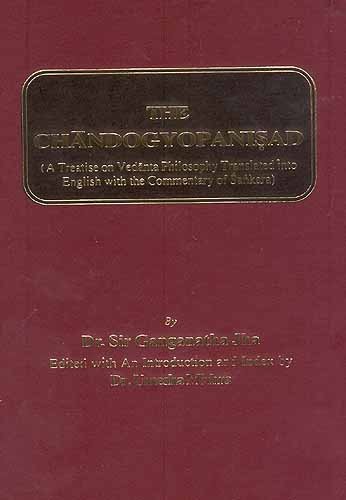Chandogya Upanishad (Shankara Bhashya)
by Ganganatha Jha | 1942 | 149,749 words | ISBN-10: 8170842840 | ISBN-13: 9788170842842
This is the English translation of the Chandogya Upanishad, an ancient philosophical text originally written in Sanksrit and dating to at least the 8th century BCE. Having eight chapters (adhyayas) and many sub-sections (khandas), this text is counted among the largest of it's kind. The Chandogya Upanishad, being connected to the Samaveda, represen...
Section 5.13 (thirteenth khaṇḍa) (two texts)
Upaniṣad text:
Then he said to Satyayajña-Pauluṣi :—‘O, ancient adept, what is that Self on which you meditate?’—He replied—‘The Sun, O Revered King.’—‘This that you meditate upon as Self is that Vais vānara Self which is multiform. Hence, it is that in your family are seen many all-coloured things’.—(1)
Commentary (Śaṅkara Bhāṣya):
He said to Satyayajña-Pauluṣi—‘O ancient adept, what is that Self on which you meditate?’—He said—‘The Sun, O Revered King,’—‘This that you meditate upon is that Vaiśvānara-Self which is multiform’;—the Sun is called ‘multiform’, because of the presence there of white, blue and other colours.—or because of its containing all forms; as a matter of fact, all colours have their origin in the Sun; hence the Sun is ‘multiform”.—and on account of your meditating upon the Sun there are seen in your family many multiform things,—in the form of accessories useful in this and in the other world’.—(1)
Upaniṣad text:
‘Ready (for you) is the chariot with mules, slave-girls and jewels; you eat food and see what is dear. One who thus meditates upon this Vaiśvānara-Self eats food and sees what is dear; and there is
Brahmic glory in his family.—But this is only the Eye of the Self.’—He said—‘You would have become blind if you had not come to me.’—(2)
Commentary (Śaṅkara Bhāṣya):
Further,—‘Ready for you is the chariot with mules,—i.e. the chariot with mules yoked to it,—also slave-girls along with jewels—i.e. necklace;—you eat food etc., etc.,’—as before.—But the Sun is only the eye of Vaiśvā-nara and since you meditate upon this as the whole Vaiśvānara, you would have become blind—deprived of your eyes, —if you had not come to me’,—as before.—(2)
End of Section (13) of Discourse V
